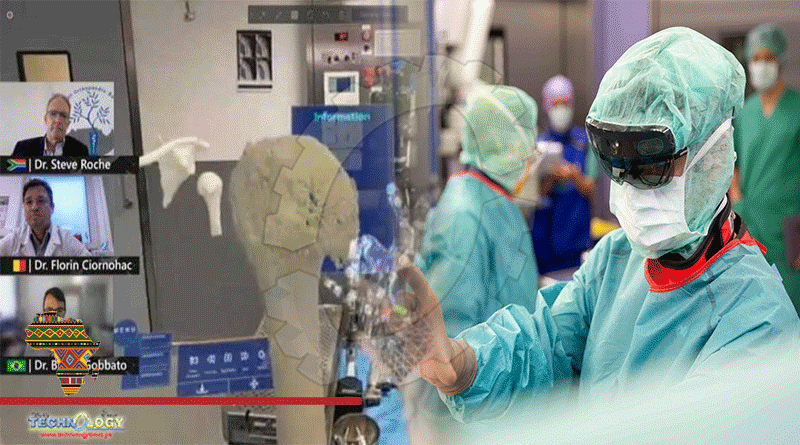Microsoft brings mixed reality solutions to clinicians and enables surgeons to improve medical practice during a surgery in South Africa

South African surgeon, Professor Stephen Roche from Groote Schuur Hospital and the University of Cape Town (UCT), is one of 15 surgeons from 13 different countries worldwide who have undertaken 13 mixed reality orthopaedic operations as part of a 24-hour event.
Professor Roche participated in three of the 13 surgeries, leading the surgery in South Africa –and assisting in two surgeries conducted in France and Germany.
The surgeons virtually collaborated using Microsoft HoloLens 2, and were led by Professor Thomas Grégory of the Avicenne AP-HP Hospital, France. Professor Grégory performed the first ever mixed reality surgery in December 2017.
Medicine’s (virtual) world tour
Professor Grégory and his team led all 13 mixed reality surgeries from the Avicenne AP-HP Hospital. From there, the surgery toured a number of countries, including: South Africa, France, India, UAE, Ukraine, Germany, Belgium, Morocco, Brazil, Bolivia, Mexico, USA, UK.
Equipped with the HoloLens 2, the surgeons in each country were able to:
Visualise and operate surgery via hologram;
Share their real-time view of the surgery, benefitting from remote peers’ expertise on different clinical cases;
Train their peers remotely, enriching their surgical practices.
HoloLens is a wireless, holographic mixed reality headset that connects with apps and solutions to enhance or enable collaboration, innovation and productivity. Compared to previous designs, HoloLens 2 is lighter, more comfortable and immersive for the surgeon. Hand and eye-tracking technology detects where the surgeon’s gaze is, allowing them to operate with greater precision.
The event’s international component enabled healthcare practitioners from different countries and cultures to share the diversity and richness of their respective practices:
Professor Stephen Roche (Orthopaedic surgeon, Groote Schuur Hospital and University of Cape Town): “Interactions during the meetings and recording the surgery make you feel the other surgeons are in the room with you. Using this new technology and discussing surgery of the shoulder with world-recognised surgeons has allowed closer relations with the international shoulder community, especially as our normal interactions in international meetings have been cancelled during the pandemic. We are all trying to solve some of the problems of shoulder replacements from different perspectives, and this allows us to share our knowledge in real-time. I think it has been a fantastic opportunity to show shoulder surgery in South Africa to the world.”
Dr Ashish Babhulkar (Head of Shoulder & Sports Injuries Department, Deenanath Mangeshkar Hospital Pune, India): “In some countries where expertise is higher, surgeons have better results on some specific clinical cases. This experience has allowed us to learn from others in a new way and improve our surgical skills.”
Dr Bruno Gobatto (Orthopaedic Surgeon – Shoulder & Elbow, Jaragua Hospital Brazil): “The greatness of this project is in its ability to bring together people from different cultures and expertise. This is the best way to democratise the use of mixed reality in the surgical block.”
Dr Rashed Alshaeel (Director of Orthopedic & Trauma, VPS Burjeel Medical City, UAE): “HoloLens will change the way we operate. We will start using it to train our future surgeons and for remote assistance. It’s a new world for the healthcare industry.”
Professor Thomas Gregory (Shoulder, Elbow, Wrist and Hand Surgeon, Avicenne AP-HP Hospital, France): “Mixed reality transforms our surgical practices. HoloLens 2 acts as an assistant and allows us to use technology to secure and standardise surgeries.”
Sikhumbuzo Ngcobo (Public Sector Director, Microsoft South Africa): “We believe that if there is one area where technology should have a significant impact in serving public interest, it is in healthcare. Effective use of technology contributes to improving care globally. From patient experience and caregiver practice, through to providing more comprehensive and secure information to all stakeholders.”
Roundtable discussions demonstrate a shared vision and perspective
In addition to the 24-hour broadcast, the event was complemented by some 25 recorded roundtable discussions focused on the contribution of technology to surgical practice, and the future of medicine.
Over 60 international healthcare professionals discussed the strengths of mixed reality, artificial intelligence, and more generally, technological innovation, for their discipline. These panels were also an opportunity to highlight the importance of the development of e-health and present the future of training in the healthcare field.
Originally published at Microsoft
